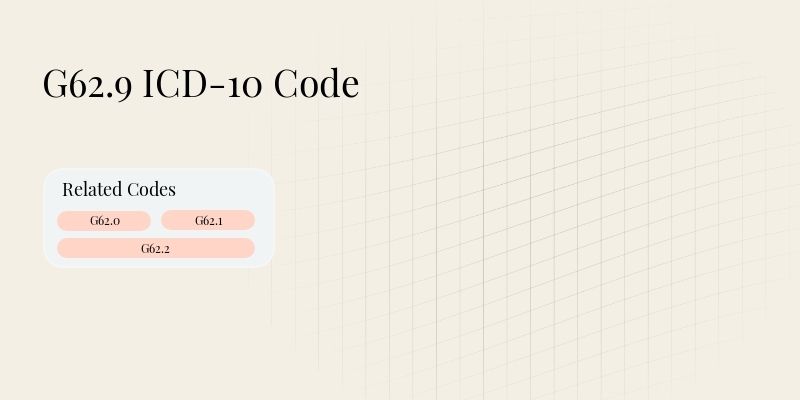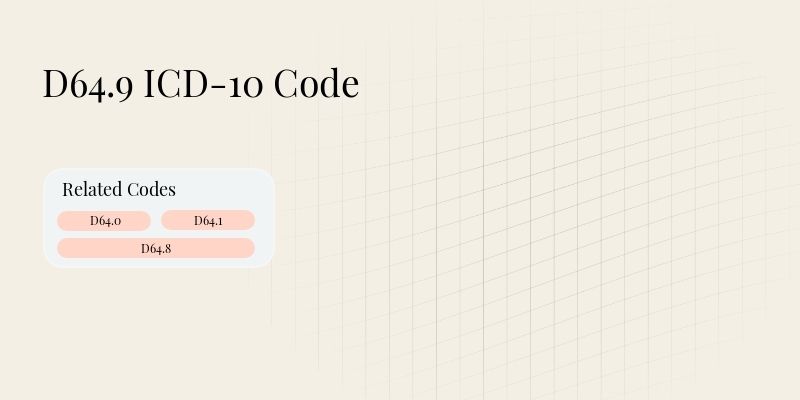
G62.9 ICD-10 Code: Peripheral Neuropathy

Key Takeaways
- What G62.9 ICD-10 Code Covers: This code is used to classify peripheral neuropathy, which includes a variety of disorders affecting the peripheral nervous system, leading to symptoms like numbness, tingling, and pain in the limbs.
- Session duration requirements: Documentation should reflect the duration of symptoms over a specific period, often requiring patient history and clinical evaluations to determine the severity and duration of the neuropathy.
- Who can use the code: Healthcare providers such as neurologists, primary care physicians, and pain management specialists can apply this code when diagnosing or treating patients with peripheral neuropathy.
- Best practice for proper use: Ensure accurate documentation of symptoms and patient history, as well as the specific nature of the neuropathy to avoid billing errors and denials.
- Example of actual usage: A patient presenting with chronic diabetic neuropathy would be diagnosed with this code during their evaluation for pain management strategies.
What is G62.9 ICD-10 Code
The G62.9 code in the ICD‑10 classification system refers to peripheral neuropathy, a condition characterized by damage to the peripheral nerves. This damage can result from various underlying causes, such as diabetes, trauma, infections, or exposure to toxins. The code is classified under "Diseases of the nervous system," highlighting its neurological basis.
Peripheral neuropathy can manifest in various ways, including pain, weakness, numbness, and changes in sensation, primarily affecting the limbs. Because the symptoms can significantly impact a patient's quality of life, accurate coding and documentation are vital for effective treatment and reimbursement.
Services Covered Under G62.9 ICD-10 Code
This code encompasses a range of services aimed at diagnosing and managing peripheral neuropathy. The following table provides a detailed overview of these services:
Service | Description | Typical Providers |
|---|---|---|
Neurological Evaluation | A comprehensive assessment of the patient's neurological function to identify symptoms of neuropathy. | Neurologist, Primary Care Physician |
Electromyography (EMG) | A test to measure electrical activity in muscles, helping identify nerve dysfunction. | Neurologist, Physiatrist |
Nerve Conduction Studies | Tests that measure how fast nerves can send electrical signals, useful for diagnosing specific nerve damage. | Neurologist, Orthopedist |
Physical Therapy | Rehabilitation services aimed at improving mobility and reducing pain associated with neuropathy. | Physical Therapist |
Who Can Use the G62.9 ICD-10 Code?
Various healthcare professionals can apply this code when diagnosing or treating patients with peripheral neuropathy. Below are key providers who may use this code:
- Neurologists: Specialists who diagnose and treat nerve disorders, including peripheral neuropathy, often through detailed neurological examinations.
- Primary Care Physicians: General practitioners who assess and manage patients with symptoms of neuropathy as part of broader health evaluations.
- Pain Management Specialists: Providers focused on treating chronic pain conditions, including those caused by nerve damage.
- Physiatrists: Medical professionals specializing in rehabilitation, managing physical therapy and rehabilitation strategies for neuropathy patients.
How to Use G62.9 ICD-10 Code
Proper use of this code is crucial for accurate billing and effective patient management. Here are guidelines for its application:
- Document Symptoms Clearly: Ensure that all symptoms are documented in the patient's medical record. For example, a patient reporting numbness and tingling in their feet should have these symptoms clearly noted.
- Include Duration of Symptoms: Record the duration of the symptoms. For instance, if symptoms have persisted for more than six months, this detail should be included in the documentation.
- Link to Underlying Conditions: When applicable, link peripheral neuropathy to underlying conditions, such as diabetes or alcohol abuse, in the medical record. For example, if a patient with diabetes presents with neuropathy, this should be clearly stated.
Reimbursement Rates for G62.9 ICD-10 Code
The reimbursement rates for this code can vary based on insurance provider and geographic location. Below is a comparison of reimbursement rates:
Insurance Type | Average Reimbursement Rate |
|---|---|
Medicare | $150 |
Medicaid | $90 |
Private Insurance | $130 |
Self-Pay | $200 |
Disclaimer: Reimbursement rates are subject to change based on various factors, including policy updates and regional differences. This article will be kept updated with average prices.
Benefits of G62.9 ICD-10 Code
Using this code correctly has several advantages, as outlined in the following table:
Benefit | Description |
|---|---|
Accurate Diagnosis | Correct coding helps ensure patients receive the appropriate diagnosis and treatment for their condition. |
Streamlined Billing | Proper use of the code facilitates easier billing and reduces the likelihood of claim denials. |
Enhanced Patient Care | Improved documentation and coding lead to better treatment plans and patient outcomes. |
Common Mistakes to Avoid with G62.9 ICD-10 Code
Misuse of this code can lead to audits and claim denials, so understanding common pitfalls is essential. Below are some common mistakes:
- Inadequate Documentation: Failing to document symptoms thoroughly may lead to billing issues. For example, a healthcare provider might simply note "neuropathy" without detailing the symptoms or their duration.
- Incorrect Linking of Codes: Not linking the peripheral neuropathy code to an underlying condition can result in denials. For instance, a diabetic patient may have their neuropathy misdiagnosed without mention of their diabetes.
- Using the Code for Non-Peripheral Causes: Incorrectly applying this code to conditions that do not involve peripheral nerves can cause claims to be rejected. An example includes using it for central nervous system disorders instead.
- Failure to Update Patient Records: Not updating patient records with new symptoms or changes in condition can lead to inaccuracies in coding. For instance, if a patient develops new symptoms months after the initial diagnosis, this should be documented accordingly.
G62.9 ICD-10 Code vs other codes
Comparing this code with other similar codes can clarify its specific usage. Below is a detailed comparison:
ICD-10 Code | Description | Distinguishing Factors |
|---|---|---|
G62.0 | Diabetic neuropathy | Specifically relates to neuropathy caused by diabetes. |
G62.1 | Alcoholic neuropathy | Specifically addresses neuropathy resulting from chronic alcohol use. |
G62.2 | Idiopathic neuropathy | Used when the cause of neuropathy is unknown. |
G62.9 | Peripheral neuropathy unspecified | A general code for peripheral neuropathy without specifying the cause. |
Conclusion
The G62.9 ICD‑10 code is essential for accurately classifying peripheral neuropathy, a condition that can significantly impact patients' lives. Proper understanding of this code enhances the accuracy of diagnoses and treatment plans and ensures efficient billing processes. Healthcare providers must be diligent in documenting symptoms, linking them to underlying conditions, and avoiding common coding errors.
Disclaimer: This article is for informational purposes only and does not constitute legal or medical advice. Always consult professional guidelines and regulatory bodies for specific compliance requirements.
Frequently Asked Questions
Reduce burnout,
improve patient care.
Join thousands of clinicians already using AI to become more efficient.

97804 CPT Code: Medical Nutrition Therapy
Discover essential insights on the 97804 CPT Code code for health professionals. Enhance your practice and navigate billing with confidence.

D64.9 ICD-10 Code: Normocytic Anemia
Discover essential insights on the D64.9 ICD-10 Code code for health professionals. Enhance your practice and navigate billing with confidence.

99205 CPT Code: New Patient
Discover essential insights on the 99205 CPT Code code for health professionals. Enhance your practice and navigate billing with confidence.
